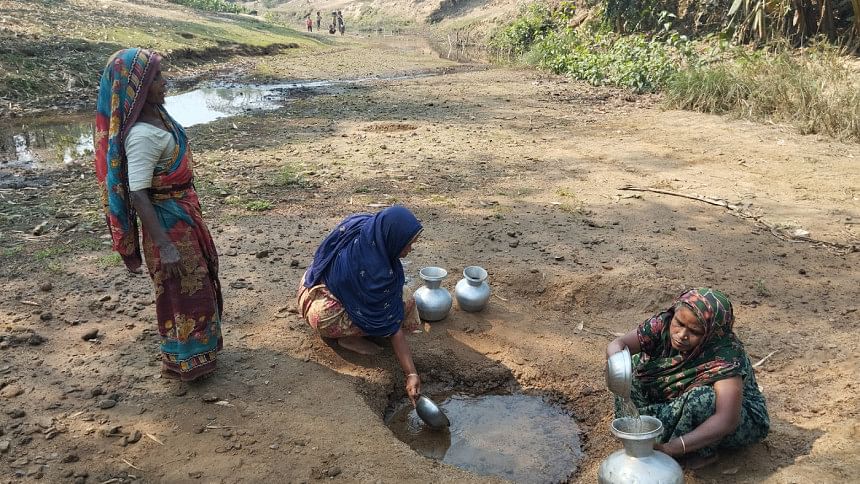‘Every day, we walk miles for water’

More than 500 poor families, including many from the indigenous Garo community, have been hit by an acute crisis of drinking water in 15 villages under Mymensingh's Dhobaura upazila.
The crisis, which persisted for decades, only exacerbated over the recent years as there is little to no feasibility of installing tube-wells or submersible pumps to draw up water in the hilly areas of the upazila along the border, said locals.
On different occasions, local administration took initiatives for arranging safe drinking water for the people, but it has not been enough to mitigate the crisis, especially in the dry season, they added.
"There is hardly any natural source of water in this area apart from some hilly streams which stop flowing during the dry season, making life extremely difficult for the local people," said Md Humayun Kabir Sarker, chairman of Dakshin Maizpara Union Parishad.
The groundwater table in the plain land also depletes during this time, worsening the situation, he added.
Humayun Kabir said they have installed 10 deep tube-wells in the locality over the last three years, but it has not been enough.
Women, who mainly perform the task of collecting water for their families, often have to walk long distances to find a small spring or well.
"I have to walk miles to collect water... it is exhausting. Then we have to carry the pitchers back home every day," said Amena Khatun, a resident of Gilagara village.
Eti Chisim said it is only during the monsoon that they get some respite when the hilly streams flow again after the rains. "During this time, we collect and store water for drinking," she said.
The villagers alleged that while setting up an adequate number of deep tube-wells in these hilly areas is not a tough task, it has been ignored by local politicians despite their pledge ahead of every local and national elections.
Contacted, Md Shafiul Azam, sub-assistant engineer of Public Health and Engineering Department in Dhobaura, said they have installed over 250 submersible pumps over the past five years to supply drinking water through reserve tanks in the hilly areas.
"These pumps are more effective than wells. However, the demand for water is several times higher. A proper plan involving the public representatives is necessary to establish a sustainable water supply chain in these villages," he added.
Nishat Sharmin, upazila nirbahi officer of Dhobaura, said they are planning to install more submersible pumps in the locality to mitigate the water crisis.

 For all latest news, follow The Daily Star's Google News channel.
For all latest news, follow The Daily Star's Google News channel. 








Comments